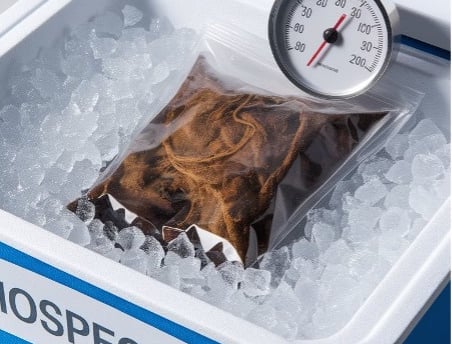The Challenges of Shipping Biospecimens Globally
This document explores the complexities of transporting biospecimens globally, highlighting the unique challenges faced by the life sciences industry. It delves into regulatory hurdles, temperature sensitivity, specialized handling requirements, and the importance of efficient logistics solutions. Finally, it showcases how UPS's LabPort platform is revolutionizing biospecimen shipping, offering a tailored approach to overcome these challenges and drive scientific progress.


This document explores the complexities of transporting biospecimens globally, highlighting the unique challenges faced by the life sciences industry. It delves into regulatory hurdles, temperature sensitivity, specialized handling requirements, and the importance of efficient logistics solutions. Finally, it showcases how UPS's LabPort platform is revolutionizing biospecimen shipping, offering a tailored approach to overcome these challenges and drive scientific progress.
by Frank Dias, Jr., CEO at Vector BioSource Inc.
Regulatory Complexities of Shipping Biospecimens
Navigating the global shipment of biospecimens involves navigating a complex web of international regulations. Each country possesses distinct requirements for importing and exporting biological materials, with rules varying significantly depending on the specimen type and intended use. Compliance with these regulations is critical to avoid delays, penalties, or even confiscation of materials. The complexities of adhering to these diverse regulations add a significant layer of challenge for companies transporting biospecimens across borders.
Temperature Sensitivity of Biospecimens
Many biospecimens are highly sensitive to temperature fluctuations. Whether they need to remain frozen at -80°C or refrigerated at 2–8°C, maintaining the correct temperature throughout the shipping process is crucial. Even minor deviations can compromise the viability of the samples, rendering them unusable for research, clinical trials, or diagnostics. The need for precise temperature control adds another layer of complexity to the logistics of biospecimen shipping.
Time Sensitivity and Specialized Handling
Biospecimens often have a limited shelf life, demanding timely delivery. Delays caused by customs clearance, transportation mishaps, or inadequate logistics planning can jeopardize the integrity of the samples. Additionally, unlike standard shipments, biospecimens require specialized packaging, labeling, and handling. This includes leak-proof containers, accurate documentation, and adherence to International Air Transport Association (IATA) guidelines for shipping dangerous goods. Ensuring these standards adds further complexity to the logistical process.
Time Sensitivity
The limited shelf life of biospecimens necessitates efficient logistics to ensure timely delivery and maintain sample integrity. Delays in customs clearance, transportation mishaps, or inadequate planning can compromise the quality of the specimens.
Specialized Handling
Shipping biospecimens demands specialized handling and packaging procedures that go beyond traditional shipping practices. Biospecimens require leak-proof containers to prevent any accidental spills or contamination. Accurate documentation, including detailed information about the specimen type, origin, and intended use, is crucial for customs clearance and regulatory compliance. Furthermore, adherence to International Air Transport Association (IATA) guidelines for shipping dangerous goods is essential to ensure safe and compliant transportation, especially for infectious or hazardous materials.
Leak-proof containers
Accurate documentation
IATA compliance
These specialized handling requirements add an extra layer of complexity to biospecimen logistics, requiring meticulous attention to detail and adherence to strict protocols to ensure that specimens are transported safely and effectively.
UPS LabPort: A Game Changer for Biospecimen Logistics
Recognizing the unique challenges of shipping biospecimens, UPS has developed LabPort, a specialized logistics platform designed to streamline the transportation of biologics and biospecimens. This platform leverages UPS's extensive global network and expertise to offer tailored solutions that address the specific needs of the life sciences industry.
Customized Shipping Solutions: LabPort provides end-to-end services, including temperature-controlled transportation, real-time tracking, and compliance with global regulatory standards.
Speed and Reliability: With dedicated lanes and expedited customs clearance, LabPort ensures that biospecimens reach their destination on time, every time.
Advanced Technology: The platform incorporates state-of-the-art monitoring tools to provide real-time updates on temperature, location, and other critical parameters, ensuring transparency and control throughout the shipping process.
The Growing Need for Biospecimen Logistics
The life sciences industry is experiencing rapid growth, driven by advancements in personalized medicine, clinical trials, and biopharmaceuticals. This growth has led to an increasing demand for tailored logistics services for biologics and biospecimens.
Clinical Trials: The complexity and globalization of clinical trials, involving multiple sites and diverse patient populations, necessitates seamless coordination of biospecimen shipments across continents, often under strict time and temperature constraints.
Biopharma Expansion: The rise of biopharmaceuticals, including vaccines, gene therapies, and monoclonal antibodies, demands precise handling and transportation conditions to ensure their efficacy.
Emerging Markets: Countries in Asia, Africa, and Latin America are becoming hubs for clinical research and biopharmaceutical manufacturing, presenting logistical challenges due to infrastructure limitations and regulatory complexities. Customized solutions like LabPort can bridge these gaps, enabling smoother operations.
LabPort: Enabling Scientific Progress
The global need for biologics and biospecimens continues to grow, and so does the demand for innovative logistics solutions. UPS's LabPort represents a significant step forward in addressing these challenges, offering a reliable and tailored approach to biospecimen shipping.
Conclusion: A Future Enabled by Logistics
With continued investment in technology and infrastructure, the life sciences industry can look forward to a future where logistics is no longer a bottleneck but a seamless enabler of scientific progress. By overcoming the challenges of biospecimen shipping, companies like UPS are not just advancing logistics—they are contributing to the acceleration of life-saving innovations worldwide.
